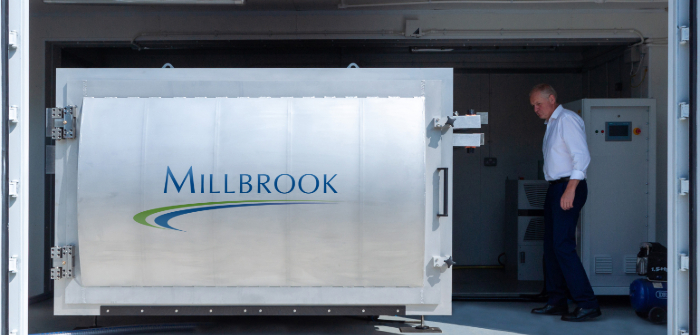Millbrook Proving Ground has revealed a new battery test chamber that can simulate altitude conditions for electric vehicle power cells.
All lithium batteries must meet UN38.3 criteria before they are transported by land, sea or air. Millbrook says its new battery altitude test chamber has the ability to simulate unpressurized aeroplane space at altitudes up to 15,000m. This adds to Millbrook’s extensive offering of UN38.3 tests at its Bedfordshire proving ground.
During a UN38.3 altitude test, the battery is stored in the chamber at 11.6kPa for an extended period (>6 hours) to simulate the product shipping process. Following this, it is inspected against a set list of criteria. This includes checking for any mass loss, leaking, rupture or venting.
The chamber is 3.2 x 2 x 1m, meaning it can test some of the largest battery packs on the market at a variety of altitudes, including negative ones. The ability to set specific positive and negative altitudes means that the chamber can simulate air pressures such as those found in mountain ranges or mines, ideal for testing electric and autonomous mountain or mining machinery batteries.
“We are continuing to invest in battery testing equipment and expertise to help our customers get their products to market more quickly. This new facility is an exciting addition to our test capabilities,” said Peter Miller, chief engineer, battery, at Millbrook.
The UK’s biggest investment in private battery testing resulted in Millbrook opening its battery test facility in September 2019. The new battery altitude test chamber is part of the continuous growth of this capability. Millbrook can assess the life of battery cells, modules and packs; determine battery safety in a wide range of situations; and validate the performance of automotive batteries under a range of environmental conditions.


